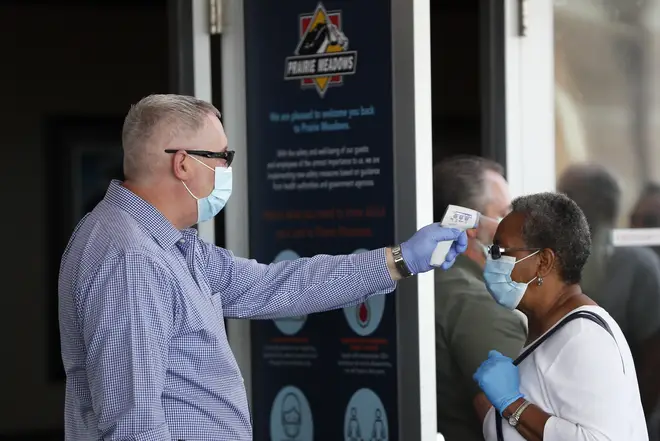
Tom Swarbrick 4pm - 6pm
25 June 2020, 22:06

The US has seen a spike in new coronavirus cases, with the number of daily confirmed infections approaching the peak reached in late April.
While greatly expanded testing probably accounts for some of the increase, experts say other measures indicate the virus is making a comeback.
The US recorded 34,500 Covid-19 cases on Wednesday, slightly fewer than the day before but still near the high of 36,400 reached on April 24, according to a count kept by Johns Hopkins University.
Deaths per day in the US number around 600 after peaking at about 2,200 in mid-April.
The daily average has climbed by more than 50 per cent over the past two weeks.
The virus has been blamed for more than 122,000 US deaths - the world's highest toll - and more than 2.3 million confirmed infections nationwide.

New York, New Jersey and Connecticut announce quarantine from worst affected states
Daily deaths, hospital admissions and the percentage of tests that are coming back positive have also been rising over the past few weeks in parts of the country, mostly in the south and west.
In Arizona, 23 per cent of coronavirus tests conducted over the last seven days have been positive, nearly triple the national average, and a record 415 patients were on ventilators.
Mississippi saw its daily count of new cases reach new highs twice this week.
On Wednesday, New York, New Jersey and Connecticut announced that visitors from nine states that are seeing a spike in Covid-19 cases will be subject to a 14 day quarantine.
Republican governor Greg Abbott of Texas, whose state was among the first to reopen, paused any further steps and reimposed a ban on elective surgeries in some areas to preserve hospital space after the number of patients across the state more than doubled in two weeks.
The number of ChinaVirus cases goes up, because of GREAT TESTING, while the number of deaths (mortality rate), goes way down. The Fake News doesn’t like telling you that!
— Donald J. Trump (@realDonaldTrump) June 25, 2020
And Nevada's governor ordered the wearing of face masks in public, including in Las Vegas casinos.
Experts say whether the rise in cases translates into an equally dire surge in deaths across the US overall will depend on a number of factors, including most crucially, whether government officials make the right decisions.
Dr Ashish Jha, director of Harvard's Global Health Institute, said: "It is possible, if we play our cards badly and make a lot of mistakes, to get back to that level. But if we are smart, there's no reason to get to 2,200 deaths a day."
But he warned: "We have consistently underestimated this virus."
In the past few weeks, the nation's daily death toll has actually dropped markedly even as cases climbed, a phenomenon that may reflect the advent of treatments, better efforts to prevent infections at nursing homes, and a rising proportion of cases among younger adults, who are more likely than older people to survive Covid-19.
Several states set single-day case records this week, including Arizona, California, Nevada, Texas and Oklahoma.
Listen & subscribe: Global Player | Apple Podcasts | Google Podcasts | Spotify
European nations appear on track to reopen their shared borders by July 1, and the European Union is considering barring American visitors, given the flare-up in the US and President Donald Trump's ban on Europeans entering the United States.
In Paris, the Eiffel Tower reopened to visitors for the first time after 104 days - its longest-ever peacetime closure.
Skyscraper-studded Dubai, in the United Arab Emirates, ended a months-long nightly curfew.
Door-to-door testing is starting in Melbourne, Australia, to control a hot spot there.
In China, where the virus first appeared late last year, an outbreak in Beijing appeared to have been brought under control. China reported 19 new cases nationwide amid mass testing in the capital.
Worldwide, there have been more than 9.4 million confirmed cases and nearly half a million have died, according to Johns Hopkins' count.